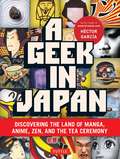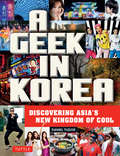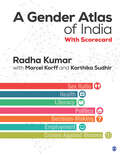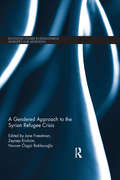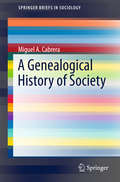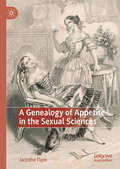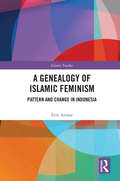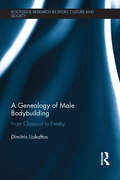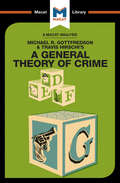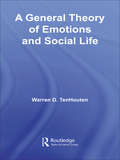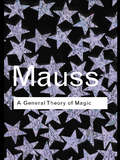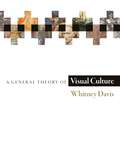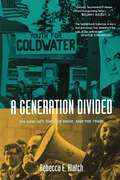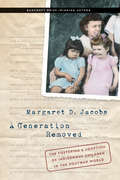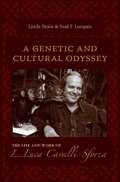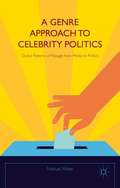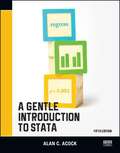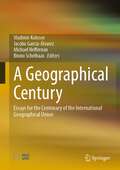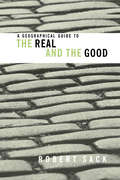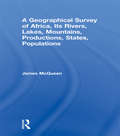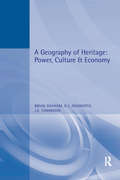- Table View
- List View
A Geek in Japan
by Hector GarciaFor every fan of manga, anime, J-pop, or Zen, A Geek in Japan is a hip, smart and concise guide to the land that is their source. Comprehensive and well informed, it covers a wide array of topics in short articles accompanied by sidebars and numerous photographs, providing a lively digest of the society and culture of Japan. Designed to appeal to the generations of Westerners who grew up on Pokemon, manga and video games, A Geek in Japan reinvents the culture guide for readers in the Internet age.Spotlighting the originality and creativity of the Japanese, debunking myths about them, and answering nagging questions like why they're so fond of robots, author Hector Garcia has created the perfect book for the growing ranks of Japanophiles in this inspired, insightful and highly informative guide.
A Geek in Korea
by Daniel TudorFor every fan of K-Pop music, Korean Wave dramas and Kimchi--or anyone intrigued by Korea and Korean culture--A Geek in Korea is a hip, new guide to the land of the Samsung smartphone and Gangnam Style.Author Dan Tudor first arrived in Korea on the eve of the 2002 World Cup when South Korea played Italy in the finals. What he saw inspired him to return and work in Korea. He served as The Economist magazine's Korea correspondent for three years, and he writes regular columns for the national daily Joongang Ilbo newspaper. Along the way, he has developed a great love and admiration for Korean culture and the Korean people.A Geek in Korea reinvents the culture guide for the Internet age. Packed with articles and photographs, it covers all the touchstones of Korean culture--from Buddhism and Confucianism to chapters on the traditional arts and disciplines like Taekwondo.Spotlighting the originality and creativity of the Koreans, debunking myths about them, and answering nagging questions like why they're so obsessed with education and success--Tudor has created the perfect book for the growing ranks of Koreaphiles in this inspired, insightful, and highly informative guide.
A Gender Atlas of India: With Scorecard
by Radha Kumar Marcel Korff Karthika SudhirA Gender Atlas of India is a seminal body of work which comprehensively maps and grades India’s performance from 2001 to 2016 on issues of concern for women. Taking into account 8 overall indicators and 28 sub-indicators, it looks at how India is performing on various aspects, including sex ratio, women’s education, employment, health, political participation and representation; and prevention of crimes against women. Unlike previous attempts, this book examines the change in India’s performance over a 15-year period, compares the situation of women in India to that in its neighborhood and internationally, and rates each Indian state and union territory individually. The findings in this book are both provocative and incentivizing for policymakers—they show that where the central and state governments share concerns India’s performance on gender has improved, but where they diverge women’s condition has deteriorated even further. With data from a range of government and independent institutions, the Census of India, Family Health Surveys, UN Statistics, World Bank data, and NGO and industry surveys, this book is an essential reference for policymakers, government departments, libraries, and individuals.
A Gendered Approach to the Syrian Refugee Crisis (Routledge Studies in Development, Mobilities and Migration)
by Jane Freedman Zeynep Kivilcim Nurcan Özgür BaklacıoğluThe refugee crisis that began in 2015 has seen thousands of refugees attempting to reach Europe, principally from Syria. The dangers and difficulties of this journey have been highlighted in the media, as have the political disagreements within Europe over the way to deal with the problem. However, despite the increasing number of women making this journey, there has been little or no analysis of women’s experiences or of the particular difficulties and dangers they may face. A Gendered Approach to the Syrian Refugee Crisis examines women’s experience at all stages of forced migration, from the conflict in Syria, to refugee camps in Lebanon or Turkey, on the journey to the European Union and on arrival in an EU member state. The book deals with women’s experiences, the changing nature of gender relations during forced migration, gendered representations of refugees, and the ways in which EU policies may impact differently on men and women. The book provides a nuanced and complex assessment of the refugee crisis, and shows the importance of analysing differences within the refugee population. Students and scholars of development studies, gender studies, security studies, politics and middle eastern studies will find this book an important guide to the evolving crisis.
A Genealogical History of Society (SpringerBriefs in Sociology)
by Miguel A. CabreraThis book provides a detailed reconstruction of the process of formation of the modern concept of society as an objective entity from the 1820s onwards, thus helping to better understand the shaping of the modern world and the nature of the current crisis of modernity. The concept has exerted considerable influence over the last two centuries, during which time many people have conceived themselves and behave as members of a society, and social scientists have explained human subjectivities and conducts as social effects. For both groups, society exists as a very real phenomenon. Historical inquiry shows, however, that the modern concept of society is no more than a historically contingent way of imagining and making sense of the human world.
A Genealogy of Appetite in the Sexual Sciences
by Jacinthe FloreThis book offers a genealogy of the medicalisation of sexual appetite in Europe and the United States from the nineteenth to twenty-first century. Histories of sexuality have predominantly focused on the emergence of sexual identities and categories of desire. They have marginalised questions of excess and lack, the appearance of a libido that dwindles or intensifies, which became a pathological object in Europe by the nineteenth century. Through a genealogical approach that draws on the writings of Michel Foucault, A Genealogy of Appetite in the Sexual Sciences examines key ‘moments’ in the pathologisation of sexuality and demonstrates how medical techniques assumed critical roles in shaping modern understandings of the problem of appetite. It examines how techniques of the patient case history, elixirs and devices, measurement, diagnostic manuals and pharmaceuticals were central to the medicalisation of sexual appetite. Jacinthe Flore argues that these techniques are significant for understanding how a concern with ‘how much?’ has transformed medical knowledge of sexuality since the nineteenth century. The questions of ‘how much?’, ‘how often?’ and ‘how intense?’ thus require a genealogical investigation that pays attention to the emergence of medical techniques, the transformation of forms of knowledge and their effects on the problematisations of sexual appetite.
A Genealogy of Evil: Anti-Semitism from Nazism to Islamic Jihad
by David Patterson"Based on extensive scrutiny of primary sources from Nazi and Jihadist ideologues, David Patterson argues that Jihadist antisemitism stems from Nazi ideology. This book challenges the idea that Jihadist antisemitism has medieval roots, identifying its distinctively modern characteristics and tracing interconnections that link the Nazis to the Muslim Brotherhood to the PLO, Fatah, Hamas, Islamic Jihad, Hezbollah, Al-Qaeda, the Sudan, the Iranian Islamic Republic, and other groups with an antisemitic worldview. Based on his close reading of numerous Jihadist texts, Patterson critiques their antisemitic teachings and affirms the importance of Jewish teaching, concluding that humanity needs the very Jewish teaching and testimony that the Jihadists advocate destroying"--
A Genealogy of Islamic Feminism: Pattern and Change in Indonesia (Routledge Islamic Studies Series)
by Etin AnwarA Genealogy of Islamic Feminism offers a new insight on the changing relationship between Islam and feminism from the colonial era in the 1900s to the early 1990s in Indonesia. The book juxtaposes both colonial and postcolonial sites to show the changes and the patterns of the encounters between Islam and feminism within the global and local nexus. Global forces include Dutch colonialism, developmentalism, transnational feminism, and the United Nations’ institutional bodies and their conferences. Local factors are comprised of women’s movements, adat (customs), nationalism, the politics underlying the imposition of Pancasila ideology and maternal virtues, and variations of Islamic revivalism. Using a genealogical approach, the book examines the multifaceted encounters between Islam and feminism and attempts to rediscover egalitarianism in the Islamic tradition—a concept which has been subjugated by hierarchical gender systems. The book also systematizes Muslim women’s encounters with Islam and feminism into five phases: emancipation, association, development, integration, and proliferation eras. Each era discusses the confluence of global and local factors which shape the changing relationship between Islam and feminism and the way in which the discursive narrative of equality is debated and contextualized, progressing from biological determinism (kodrat) to the ethico-spiritual argument. Islamic feminism contributes to the rediscovery of Islam as the source of progress, the centering of women’s agency through spiritual equality, and the reworking of the private and public spheres. This book will appeal to anyone with interest in international women’s movements, interdisciplinary studies, cultural studies, women’s studies, post-colonial studies, Islamic studies, and Asian studies.
A Genealogy of Male Bodybuilding: From classical to freaky (Routledge Research in Sport, Culture and Society)
by Dimitris LiokaftosBodybuilding has become an increasingly dominant part of popular gym culture within the last century. Developing muscles is now seen as essential for both general health and high performance sport. At the more extreme end, the monstrous built body has become a pop icon that continues to provoke fascination. This original and engaging study explores the development of male bodybuilding culture from the nineteenth century to the present day, tracing its transformations and offering a new perspective on its current extreme direction. Drawing on archival research, interviews, participant observation, and discourse analysis, this book presents a critical mapping of bodybuilding’s trajectory. Following this trajectory through the wider sociocultural changes it has been a part of, a unique combination of historical and empirical data is used to investigate the aesthetics of bodybuilding and the shifting notions of the good body and human nature they reflect. This book will be fascinating reading for all those interested in the history and culture of bodybuilding, as well as for students and researchers of the sociology of sport, gender and the body.
A Genealogy of Public Security: The Theory and History of Modern Police Powers
by Giuseppe CampesiThere are many histories of the police as a law-enforcement institution, but no genealogy of the police as a form of power. This book provides a genealogy of modern police by tracing the evolution of "police science" and of police institutions in Europe, from the ancien régime to the early 19th century. Drawing on the theoretical path outlined by Michel Foucault at the crossroads between historical sociology, critical legal theory and critical criminology, it shows how the development of police power was an integral part of the birth of the modern state’s governmental rationalities and how police institutions were conceived as political technologies for the government and social disciplining of populations. Understanding the modern police not as an institution at the service of the judiciary and the law, but as a complex political technology for governing the economic and social processes typical of modern capitalist societies, this book shows how the police have played an active role in actually shaping order, rather than merely preserving it.
A General Theory of Crime
by William J JenkinsMichael R. Gottfredson and Travish Hirschi’s 1990 A General Theory of Crime is a classic text that helped reshape the discipline of criminology. It is also a testament to the powers of clear reasoning and interpretation. In critical thinking terms, reasoning is all about presenting a solid and persuasive case – and as many people instinctively understand, the most persuasive reasoning is that which bases itself on a single, simple hook. In Gottfredson and Hirschi’s case, this hook was what has come to be known as the “self-control theory of crime” – the idea that the tendency to commit crime is directly related to an individual’s level of self-control. While the dominant schools of thought of the time tended to focus on crime as the product of complex environmental factors, with little attempt to unify different theories, Gottfredson and Hirschi sought to interpret things so as to provide a single overarching concept that explained why crimes of all sorts were committed. Moreover, while other theories of crime concentrated on understanding and explaining specific types of law-breaking, the self-control model could, in Gottfredson and Hirschi’s view, be seen as the basis for understanding the root cause for all crime in all contexts. While such simplicity inevitably attracted as much criticism as agreement, subsequent studies have provided real-world corroboration for the General Theory’s persuasive reasoning.
A General Theory of Emotions and Social Life (Routledge Advances in Sociology)
by Warren D. TenHoutenFounded upon the psychoevolutionary theories of Darwin, Plutchik and Izard, a general socioevolutionary theory of the emotions - affect-spectrum theory - classifies a wide spectrum of the emotions and analyzes them on the sociological, psychological and neurobiological levels. This neurocognitive sociology of the emotions supersedes the major theoretical perspectives developed in the sociology of emotions by showing primary emotions to be adaptive reactions to fundamental problems of life which have evolved into elementary social relationships and which can predict occurrences of the entire spectrum of primary, complex secondary, and tertiary emotions. Written by leading social theorist Warren D. TenHouten, this book presents an encyclopaedic classification of the emotions, describing forty-six emotions in detail, and presenting a general multilevel theory of emotions and social life. The scope of coverage of this key work is highly topical and comprehensive, and includes the development of emotions in childhood, symbolic elaboration of complex emotions, emotions management, violence, and cultural and gender differences. While primary emotions have clearly defined valences, this theory shows that complex emotions obey no algebraic law and that all emotions have both creative and destructive potentialities.
A General Theory of Magic (Routledge Classics)
by Marcel MaussFirst written by Marcel Mauss and Henri Humbert in 1902, A General Theory of Magic gained a wide new readership when republished by Mauss in 1950. As a study of magic in 'primitive' societies and its survival today in our thoughts and social actions, it represents what Claude Lévi-Strauss called, in an introduction to that edition, the astonishing modernity of the mind of one of the century's greatest thinkers. The book offers a fascinating snapshot of magic throughout various cultures as well as deep sociological and religious insights still very much relevant today. At a period when art, magic and science appear to be crossing paths once again, A General Theory of Magic presents itself as a classic for our times.
A General Theory of Visual Culture
by Whitney DavisWhat is cultural about vision--or visual about culture? In this ambitious book, Whitney Davis provides new answers to these difficult and important questions by presenting an original framework for understanding visual culture. Grounded in the theoretical traditions of art history, A General Theory of Visual Culture argues that, in a fully consolidated visual culture, artifacts and pictures have been made to be seen in a certain way; what Davis calls "visuality" is the visual perspective from which certain culturally constituted aspects of artifacts and pictures are visible to informed viewers. In this book, Davis provides a systematic analysis of visuality and describes how it comes into being as a historical form of vision. Expansive in scope, A General Theory of Visual Culture draws on art history, aesthetics, the psychology of perception, the philosophy of reference, and vision science, as well as visual-cultural studies in history, sociology, and anthropology. It provides penetrating new definitions of form, style, and iconography, and draws important and sometimes surprising conclusions (for example, that vision does not always attain to visual culture, and that visual culture is not always wholly visible). The book uses examples from a variety of cultural traditions, from prehistory to the twentieth century, to support a theory designed to apply to all human traditions of making artifacts and pictures--that is, to visual culture as a worldwide phenomenon.
A Generation Divided: The New Left, the New Right, and the 1960s
by Rebecca E. KlatchThe 1960s was not just an era of civil rights, anti-war protest, women's liberation, hippies, marijuana, and rock festivals. The untold story of the 1960s is in fact about the New Right. For young conservatives the decade was about Barry Goldwater, Ayn Rand, an important war in the fight against communism, and Young Americans for Freedom (YAF). In A Generation Divided, Rebecca Klatch examines the generation that came into political consciousness during the 1960s, telling the story of both the New Right and the New Left, and including the voices of women as well as men. The result is a riveting narrative of an extraordinary decade, of how politics became central to the identities of a generation of people, and how changes in the political landscape of the 1980s and 1990s affected this identity.
A Generation Removed: The Fostering and Adoption of Indigenous Children in the Postwar World
by Margaret D. JacobsOn June 25, 2013, the U.S. Supreme Court heard the case Adoptive Couple vs. Baby Girl, which pitted adoptive parents Matt and Melanie Capobianco against baby Veronica’s biological father, Dusten Brown, a citizen of the Cherokee Nation of Oklahoma. Veronica’s biological mother had relinquished her for adoption to the Capobiancos without Brown’s consent. Although Brown regained custody of his daughter using the Indian Child Welfare Act (ICWA) of 1978, the Supreme Court ruled in favor of the Capobiancos, rejecting the purpose of the ICWA and ignoring the long history of removing Indigenous children from their families. In A Generation Removed, a powerful blend of history and family stories, award-winning historian Margaret D. Jacobs examines how government authorities in the post–World War II era removed thousands of American Indian children from their families and placed them in non-Indian foster or adoptive families. By the late 1960s an estimated 25 to 35 percent of Indian children had been separated from their families. Jacobs also reveals the global dimensions of the phenomenon: These practices undermined Indigenous families and their communities in Canada and Australia as well. Jacobs recounts both the trauma and resilience of Indigenous families as they struggled to reclaim the care of their children, leading to the ICWA in the United States and to national investigations, landmark apologies, and redress in Australia and Canada.
A Genetic and Cultural Odyssey: The Life and Work of L. Luca Cavalli-Sforza
by Linda StoneDrawing links between genetic and cultural development, Cavalli-Sforza developed groundbreaking techniques to trace the evolution of Homo sapiens and the origins of human differentiation, in addition to his earlier work in bacterial genetics. He is also the founder of the Human Genome Diversity Project and continues to work as the principal investigator at Stanford University's Human Population Genetics Laboratory. Based on extensive research and interviews with Cavalli-Sforza and his colleagues, this biography examines the scientist's life and his immense and occasionally controversial contributions to genetics, anthropology, and linguistics.
A Genetic and Cultural Odyssey: The Life and Work of L. Luca Cavalli-Sforza
by Paul F. Lurquin Stone LindaDrawing links between genetic and cultural development, Cavalli-Sforza developed groundbreaking techniques to trace the evolution of Homo sapiens and the origins of human differentiation, in addition to his earlier work in bacterial genetics. He is also the founder of the Human Genome Diversity Project and continues to work as the principal investigator at Stanford University's Human Population Genetics Laboratory. Based on extensive research and interviews with Cavalli-Sforza and his colleagues, this biography examines the scientist's life and his immense and occasionally controversial contributions to genetics, anthropology, and linguistics.
A Genre Approach to Celebrity Politics
by Nahuel RibkeExploring the transition of celebrities into institutional-electoral politics, the book argues that many insights developed by genre theorists could be highly instrumental to understand the celebrity politics phenomenon. It analyzes the historical and cultural specificity of celebrity politics as it evolved through different countries and cultures.
A Gentle Introduction To Stata (Fifth Edition)
by Alan C. AcockAlan C. Acock's A Gentle Introduction to Stata, Fifth Edition, is aimed at new Stata users who want to become proficient in Stata. After reading this introductory text, new users will be able not only to use Stata well but also to learn new aspects of Stata. Acock assumes that the user is not familiar with any statistical software. This assumption of a blank slate is central to the structure and contents of the book. Acock starts with the basics; for example, the portion of the book that deals with data management begins with a careful and detailed example of turning survey data on paper into a Stata-ready dataset on the computer. When explaining how to go about basic exploratory statistical procedures, Acock includes notes that will help the reader develop good work habits. This mixture of explaining good Stata habits and good statistical habits continues throughout the book. Acock is quite careful to teach the reader all aspects of using Stata. He covers data management, good work habits (including the use of basic do-files), basic exploratory statistics (including graphical displays), and analyses using the standard array of basic statistical tools (correlation, linear and logistic regression, and parametric and nonparametric tests of location and dispersion). He also successfully introduces some more advanced topics such as multiple imputation and structural equation modeling in a very approachable manner. Acock teaches Stata commands by using the menus and dialog boxes while still stressing the value of do-files. In this way, he ensures that all types of users can build good work habits. Each chapter has exercises that the motivated reader can use to reinforce the material. The tone of the book is friendly and conversational without ever being glib or condescending. Important asides and notes about terminology are set off in boxes, which makes the text easy to read without any convoluted twists or forward-referencing. Rather than splitting topics by their Stata implementation, Acock arranges the topics as they would appear in a basic statistics textbook; graphics and postestimation are woven into the material in a natural fashion. Real datasets, such as the General Social Surveysfrom 2002 and 2006, are used throughout the book. The focus of the book is especially helpful for those in the behavioral and social sciences because the presentation of basic statistical modeling is supplemented with discussions of effect sizes and standardized coefficients. Various selection criteria, such as semipartial correlations, are discussed for model selection. Acock also covers a variety of commands available for evaluating reliability and validity of measurements. The fifth edition of the book includes two new chapters that cover multilevel modeling and item response theory (IRT) models. The multilevel modeling chapter demonstrates how to fit linear multilevel models using the mixedcommand. Acock discusses models with both random intercepts and random coefficients, and he provides a variety of examples that apply these models to longitudinal data. The IRT chapter introduces the use of IRT models for evaluating a set of items designed to measure a specific trait such as an attitude, value, or a belief. Acock shows how to use the irt suite of commands, which are new in Stata 14, to fit IRT models and to graph the results. In addition, he presents a measure of reliability that can be computed when using IRT.
A Gentleman Undone: Blackshear Family Book 2 (Blackshear Family)
by Cecilia GrantFans of Eloisa James, Sherry Thomas, Courtney Milan and Grace Burrowes will adore Cecilia Grant's emotionally rich and deeply passionate Regency romance.Lydia Slaughter understands the games men play - both in and out of the bedroom. Not afraid to bend the rules to suit her needs, she fleeces Will Blackshear outright. The Waterloo hero had his own daring agenda for London's gaming tables. But now he prepares for a wager of wits and desire with Lydia, the streetwise temptress who keeps him at arm's length. A kept woman in desperate straits, Lydia has a sharp mind and a head for numbers. She gambles, hoping to win enough to claim her independence. An alliance with Will may be a winning proposition for them both. But the arrangement involves dicey odds with rising stakes, sweetened with unspoken promise of fleshly delights. And any sleight of hand could find their hearts betting on something neither can afford to risk: love.For more powerful, sensual romance, lose yourself in the Blackshear Family series: A Christmas Gone Perfectly Wrong, A Lady Awakened, A Gentleman Undone, A Woman Entangled.
A Geographical Century: Essays for the Centenary of the International Geographical Union
by Michael Heffernan Bruno Schelhaas Jacobo García-Álvarez Vladimir KolosovThis volume of specially commissioned interpretative essays marks the centenary of the establishment of the International Geographical Union in 1922. Written by leading human and physical geographers from all parts of the world, A Geographical Century considers the history and present condition of geography as an international science. Based on the latest research, A Geographical Century provides new and critical analyses of the different forms of geographical internationalism that emerged during the 20th century; the changing relations between geography and cognate disciplines in the natural and social sciences; the geopolitics of international geographical collaboration; and the prospects of geography as a 21st century international science.
A Geographical Guide to the Real and the Good
by Robert SackFirst published in 2003. Routledge is an imprint of Taylor & Francis, an informa company.
A Geographical Survey of Africa, Its Rivers, Lakes, Mountains, Productions, States, Populations
by James McQueenThe owner of West Indian plantations, McQueen collected extensive information from slaves which led him correctly to the conclusion that the Niger ended in the great delta of the Blight of Benin. First published in 1840.
A Geography of Heritage: Power, Culture And Economy (A\hodder Arnold Publication)
by Brian Graham Greg Ashworth John TunbridgeThe concept of heritage relates to the ways in which contemporary society uses the past as a social, political or economic resource. However, heritage is open to interpretation and its value may be perceived from differing perspectives - often reflecting divisions in society. Moreover, the schism between the cultural and economic uses of heritage also gives rise to potential conflicts of interest. Examining these issues in depth, this book is the first sustained attempt to integrate the study of heritage into contemporary human geography. It is structured around three themes: the diversity of use and consumption of heritage as a multi-sold cultural and economic resource; the conflicts and tensions arising from this multiplicity of uses, producers and consumers; and the relationship between heritage and identity at a variety of scales.
